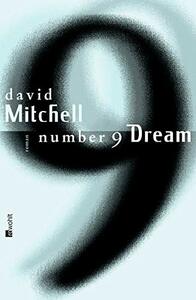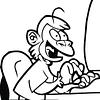You need to sign in or sign up before continuing.
Take a photo of a barcode or cover
re-read as part of my journey through the Mitchell canon. A much more cohesive narrative than I had remembered.
Worth noting that the phrase 'cloud atlas' appears as a toss away descriptive near the end, and that the Mongolian KGB agent Subhartta appears, as in Ghostwritten.
Worth noting that the phrase 'cloud atlas' appears as a toss away descriptive near the end, and that the Mongolian KGB agent Subhartta appears, as in Ghostwritten.
Not up there with Cloud Atlas or The Bone Clocks, but a good read nonetheless.
Feels very much like a Murakami novel but never reaches quite the level of a Murakami novel.
Feels very much like a Murakami novel but never reaches quite the level of a Murakami novel.
slow-paced
Plot or Character Driven:
N/A
Strong character development:
N/A
Loveable characters:
No
Diverse cast of characters:
No
Flaws of characters a main focus:
N/A
I only gave this a one star because the writing was done well. The story and the characters were not for me.
This was the first time in a while I’ve gone to the library and just picked something up without a plan, without researching beforehand, and it was weirdly exciting in that regard. This is a magic realism (but of the type that spends very long stretches as nonmagic literary fiction, mob thriller, and other stuff in between the parts that make you go “oh, this is definitely magic realism”) coming-of-age story about a young man who goes to Tokyo searching for the father he’s never met, whose name he doesn’t even know. I found Mitchell’s structural experiments hit-or-miss as usual, but I liked how this played around with the lines between dream and reality, and I found the hapless, maybe-cursed-by-a-vengeful-god protagonist increasingly endearing as the story went on, so I’d say it ended up being successful overall, though it did have a bit of a “fuck you” ending.
challenging
reflective
slow-paced
Plot or Character Driven:
A mix
Strong character development:
Complicated
Loveable characters:
Yes
Diverse cast of characters:
Yes
Flaws of characters a main focus:
Yes
A very good novel. It's highly reminiscent of Haruki Murakami's work, much more so than any other book by Mitchell I've read, but I don't consider that a bad thing by any stretch. Recommended.
Entrancing, original, and sincere, avant garde but still very accessible, continuously surprising from beginning to end.
I wish I'd written a review about this b/c now I don't remember what I liked and didn't like about it.
I'm being generous in my star rating of this novel. My thought is to give it 3 stars, but I'm giving it the benefit of the doubt and giving it 4. Joanna and I read this aloud to each other from March through August and this is not a good book to read aloud to each other as you fall asleep at night. It just didn't work despite it being a book about the fuzzy line between dream and reality.
After I was done, I read this review and it made me realize that I had missed a lot of the novel in the way I read it. Now I want to re-read it (but maybe not right away).
If you haven't read any David Mitchell before, I highly recommend "The Thousand Autumns of Jacob de Zoet" as that book is amazing.
One thing that confused us for a long time, is that we couldn't figure out when it was taking place. The first section had a futuristic element to it (which we realized was a dream sequence) but made it seem like the whole world was futuristic. In the end, it seems to be taking place when it was written. Knowing that would make the novel less confusing.
After I was done, I read this review and it made me realize that I had missed a lot of the novel in the way I read it. Now I want to re-read it (but maybe not right away).
If you haven't read any David Mitchell before, I highly recommend "The Thousand Autumns of Jacob de Zoet" as that book is amazing.
One thing that confused us for a long time, is that we couldn't figure out when it was taking place. The first section had a futuristic element to it (which we realized was a dream sequence) but made it seem like the whole world was futuristic. In the end, it seems to be taking place when it was written. Knowing that would make the novel less confusing.
It's been a while since I've read a David Mitchell book, but within the first 50 pages, I was reminded again why Mitchell is one of my favorite writers. His writing can be challenging, it's often not what you expect, and there are moments when it's just really exciting and fun. This book was an interesting tale of a young man named Eiji Miyake and his somewhat fantastical journey to make contact with his biological father, but it started to lose steam for me towards the middle. Mitchell is undoubtedly a gifted writer, but this was not one of my favorites.






